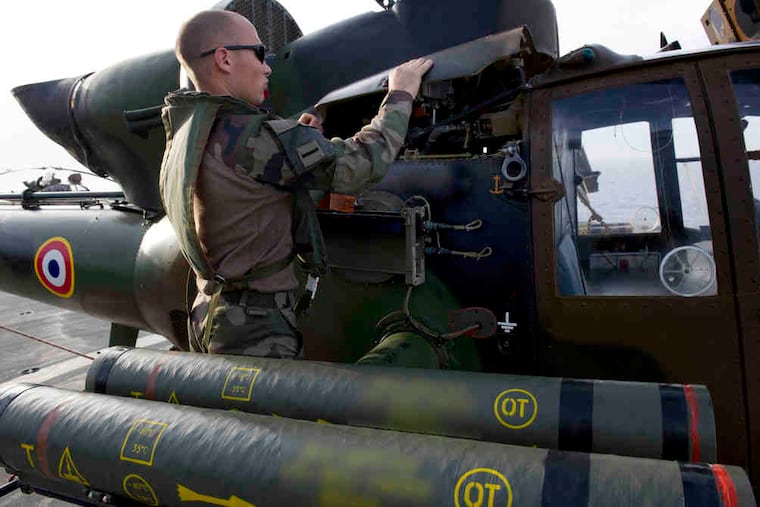NATO steps up campaign
British and French attack helicopters hit Gadhafi's troops near a key oil town.

BENGHAZI, Libya - British and French attack helicopters struck targets for the first time in NATO's campaign in Libya, hitting Moammar Gadhafi's troops early Saturday near a key coastal oil town, the alliance said. Hours later, at least eight air strikes were heard in Tripoli.
The action was a significant step-up in NATO's operations and a boost to Libyan rebels, just a day after rebel fighters forced government troops from three western towns and broke the siege of a fourth in further eroding of Gadhafi's power since the eruption in mid-February of the uprising to end his 42-year rule.
NATO said the helicopters struck military vehicles and equipment, as well as troops trying to hide in populated areas. Lt. Gen. Charles Bouchard, commander of the Libya operation, said the engagement "demonstrates the unique capabilities brought to bear by attack helicopters."
Until now, NATO has relied on fixed-wing jets, generally flying above 15,000 feet - nearly three miles high - to make night attacks on targets in Libya. But Saturday afternoon, eight thunderous explosions were heard in the capital from a rare daytime NATO strike. A Libyan government official said it was not immediately clear what was hit.
The helicopters give the alliance a key advantage in close-up combat, flying at much lower altitudes and allowing more precise targeting.
The Apaches hit two targets near the eastern oil town of Brega, according to a statement from the Ministry of Defense in London. It said they took off from HMS Ocean, stationed off the Libyan coast, and returned safely after completing their mission in the early morning hours.
British Maj. Gen. Nick Pope said the Apaches targeted a radar installation and a military checkpoint. "Hellfire missiles and 30mm cannon were used to destroy the targets," he said.
Separately from the helicopters, Royal Air Force aircraft destroyed another military installation near Brega and two ammunition bunkers at the large Waddan depot in central Libya, Pope said.
Brega is of strategic importance to Libya's oil industry and lies on the coastal road along the Mediterranean that leads to the capital, Tripoli. In the early days of the uprising against Gadhafi, it went back and forth between rebel and loyalist hands, but later the front line settled to the east of the town, leaving Brega under Gadhafi's control.
Waddan is southwest of Brega, about 140 miles from the coast.
The French Gazelle and Tiger model attack helicopters took off from the helicopter transport ship Tonnerre in the Mediterranean, said Col. Thierry Burkhard. He said they struck 15 military vehicles and five military command buildings, without identifying the sites or their location.
Burkhard said the French helicopters came under fire from light weapons but were not hit or damaged. The operation was aimed at putting "additional pressure on the Gadhafi forces who continue to threaten the civilian population," he said.
British Defense Secretary Liam Fox said Saturday that the "use of the attack helicopters is a logical extension" in NATO's campaign and indicated more would be used in the future.
"We will continue with the methods we have to degrade his [Gadhafi's] command and control, to degrade his supplies," Fox said from Singapore, where he was attending an Asian security conference.
The helicopter strikes came after Libyan rebels on Friday won control of four towns in the western Nafusa mountain range, where government forces have besieged and randomly shelled rebel-held areas for months.
The small rebel force in the western mountains is unlikely to threaten Gadhafi's hold on Tripoli, 45 miles northwest, but the victories could bring relief to local residents by opening up roads between their communities.
In Benghazi on Saturday, the head of the rebels' Transitional National Council, Mustafa Abdul-Jalil, and other rebel leaders met with British Foreign Secretary William Hague, one of the highest-ranking foreign officials to visit rebel-held territory in eastern Libya. He traveled with another British cabinet minister, International Development Secretary Andrew Mitchell, on a visit Hague said was to show support for those fighting Gadhafi's rule.